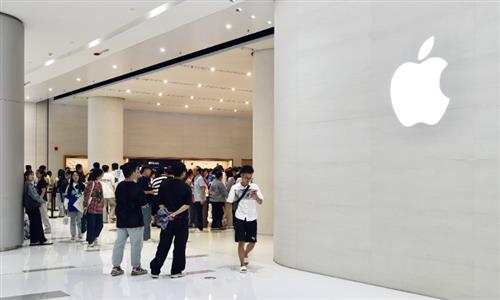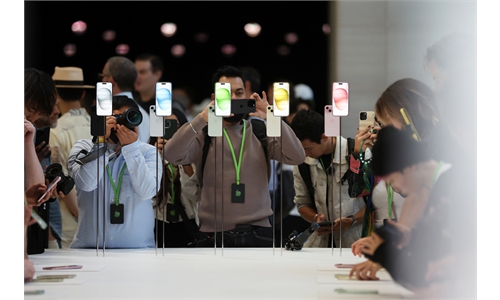Reported fall in Apple sales signals tougher competition in high-end device segment

Illustration: Liu Xiangya/Global Times
Sales of Apple's iPhone in China - a key market for the US tech giant - are in sharp focus, as more than a few media outlets reported a drop in iPhone sales. It is not yet known whether the situation is temporary or whether the iPhone giant's sales in China have reached an inflection point, but a restructuring of industry chains may provide a new perspective to the discussion.Research firm International Data Corp (IDC) said in a report published in January that Apple became the leading smartphone company in China, the world's largest smartphone market, for the first time with a record high market share of 17.3 percent in 2023. It marked a milestone, but some analysts worry that Apple's sales in China might have peaked in 2023, and might witness a downward spiral this year.
The Business Insider reported recently that noted Apple analyst Ming-Chi Kuo revealed that based on his checks, iPhone sales in China have gotten off to a bad start in 2024. Although that has not been confirmed, the topic has garnered widespread attention on Chinese social media platforms.
Apple is facing challenges in China. Many analysts attribute its decline to Huawei's return to the 5G smartphone market with its Mate 60 series. Such views are perhaps too simplistic. Not only Huawei, but also almost all other major Chinese smartphone makers are looking to push into the high-end device market to challenge the dominance of Apple.
According to a report released by IDC in December, China is expected to ship 287 million units of smartphones in 2024, a 3.6 percent year-on-year increase, driven by an improving macroeconomy and consumer appetite for better gadgets. One thing is clear: competition is intensifying in the mid- to high-end market.
Chinese domestic brands such as Huawei, Xiaomi, Oppo and Vivo have established strong footholds in the mid- to high-end market through new devices. For instance, Oppo launched its foldable smartphone called the Find N2 Flip. Honor launched a new foldable smartphone - the Magic Vs.
What lies behind this is the upgrading of China's manufacturing supply chain. Oppo said on its website that the Find N2 Flip puts an industry-leading cover screen into palms and pockets, challenging what users have come to expect from small form-factor foldables. The mature industry chain established in China is critical for producing high-end devices such as Find N2 Flip efficiently and cost-effectively.
On the one hand, the development of cutting-edge science and technology, as well as advanced manufacturing industries, is a prerequisite for Chinese smartphone makers to focus more on the high-end market. On the other hand, their focus on the high-end sector is an inevitable result of the upgrading of China's manufacturing supply chain.
Whether in the field of cutting-edge technologies, such as semiconductors, or terminal products including high-end smartphones and devices, competition is intensifying. Chinese companies are sparing no effort to break through the Washington-led technology blockade, prop up the development of these industries, and increase their competitiveness in the mid- to high-end market.
Of course, it may be not smooth sailing ahead, and in the process, some in the West may hope China will encounter setbacks, and even use various excuses to artificially set up obstacles and adopt discriminatory practices against Chinese products.
China is facing increasing trade protectionism on all fronts ranging from low-end products to high-tech products. In the global market, more efforts are needed to increase their presence, but in the Chinese domestic market, there is growing evidence that the monopoly advantage of Western companies in the mid- to high-end sector has gradually been broken.
It is not much of a surprise that Apple appears to be facing an uphill battle to reverse falling iPhone sales in China. Analysis of the manufacturing industry and supply chain may help people see Apple's performance in China from a new perspective.
The author is a reporter with the Global Times. bizopinion@globaltimes.com.cn



